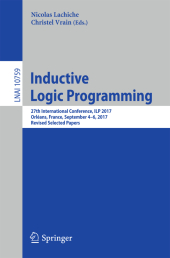 Neuerscheinungen 2018Stand: 2020-02-01 |
Schnellsuche
ISBN/Stichwort/Autor
|
Herderstraße 10
10625 Berlin
Tel.: 030 315 714 16
Fax 030 315 714 14
info@buchspektrum.de |

Nicolas Lachiche, Christel Vrain
(Beteiligte)
Inductive Logic Programming
27th International Conference, ILP 2017, Orléans, France, September 4-6, 2017, Revised Selected Papers
Herausgegeben von Lachiche, Nicolas; Vrain, Christel
1st ed. 2018. 2018. x, 185 S. 94 SW-Abb., 7 Farbabb. 235 mm
Verlag/Jahr: SPRINGER, BERLIN; SPRINGER INTERNATIONAL PUBLISHING 2018
ISBN: 3-319-78089-1 (3319780891)
Neue ISBN: 978-3-319-78089-4 (9783319780894)
Preis und Lieferzeit: Bitte klicken
This book constitutes the thoroughly refereed post-conference proceedings of the 27th International Conference on Inductive Logic Programming, ILP 2017, held in Orléans, France, in September 2017.
The 12 full papers presented were carefully reviewed and selected from numerous submissions.
Inductive Logic Programming (ILP) is a subfield of machine learning, which originally relied on logic programming as a uniform representation language for expressing examples, background knowledge and hypotheses. Due to its strong representation formalism, based on first-order logic, ILP provides an excellent means for multi-relational learning and data mining, and more generally for learning from structured data.
Relational Affordance Learning for Task-dependent Robot Grasping.- Positive and Unlabeled Relational Classification Through Label Frequency Estimation.- On Applying Probabilistic Logic Programming to Breast Cancer Data.- Logical Vision: One-Shot Meta-Interpretive Learning from Real Images.- Demystifying Relational Latent Representations.- Parallel Online Learning of Event Definitions.- Relational Restricted Boltzmann Machines: A Probabilistic Logic Learning Approach.- Parallel Inductive Logic Programming System for Super-linear Speedup.- Inductive Learning from State Transitions over Continuous Domains.- Stacked Structure Learning for Lifted Relational Neural Networks.- Pruning Hypothesis Spaces Using Learned Domain Theories.- An Investigation into the Role of Domain-knowledge on the Use of Embeddings.


